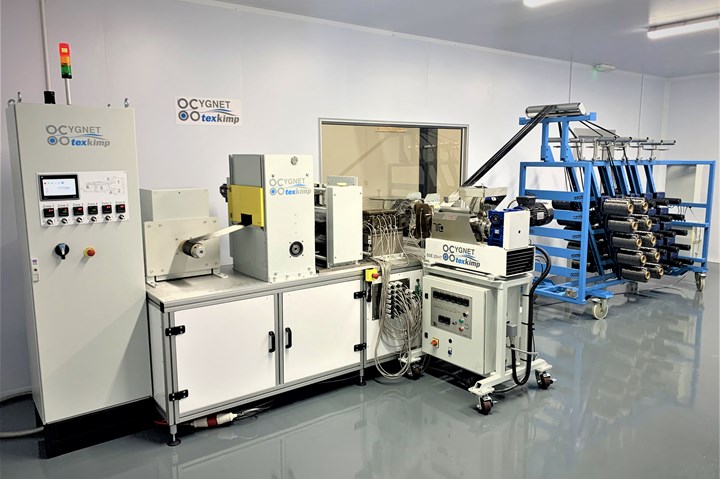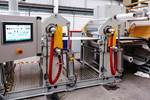Cygnet Texkimp thermoplastic lab line build supports composites innovation
Direct Melt Impregnation Thermoplastic Line to enable faster development of composites technology in automotive, aerospace, construction and energy markets through dedicated customer trials.

Lab-scale version of Cygnet Texkimp’s DMITL line. Photo Credit: Cygnet Texkimp.
Cygnet Texkimp (Northwich, Cheshire, U.K.) has installed a lab-scale version of its thermoplastic processing equipment at its U.K.-based Innovation Centre. The fiber handling and converting technology specialist is making its Direct Melt Impregnation Thermoplastic Line (DMITL) available to help companies develop new materials and material combinations to manufacture thermoplastic prepregs and tapes, with the end goal of achieving faster composites technology development.
“We’re enabling manufacturers to explore a new and novel technology, prove out their concepts and carry out innovative product development before choosing to invest,” explains Cygnet Texkimp’s Ben Lloyd. “The fast-moving composites sector needs this kind of dedicated environment to speed up adoption of new technology and support innovation. The response from the market has been phenomenal and we’re completing trials on a wide range of different materials.”
At 5 meters long x 1 meter wide, Cygnet Texkimp says the lab-scale machine is half the size of the full-scale line (which was launched in 2020 as a compact solution with a small footprint) but delivers all the capability of the original technology. It is applicable for polymers ranging from polypropylene to polyetheretherketone (PEEK) and can process a range of fibers including carbon, glass and hybrid fibers. The technology is scalable to 600 millimeters wide and can manufacture prepregs measuring down to 0.1 millimeters in thickness.
The company is working with organizations from the automotive, aerospace, construction and energy sectors, many of which want to produce their own materials to fulfill exact needs.
“Proving out new materials alongside our R&D and product specialists allows customers to develop new applications more easily, quickly and cost-effectively,” says Lloyd. “This collaborative approach enables both parties to refine and advance the technology to achieve a solution that is tailored to the application and proven in its effectiveness.”
The lab line is customizable to produce material with a specific weight per meter, heat resistance, strength, rigidity and impact resistance, and the customer is able to gather data on their material before taking next steps to put it into production.
The DMITL, launched by Cygnet Texkimp in 2020 in response to the growing interest in thermoplastic technology on the market, is capable of using polymer in standard form to create high-grade thermoplastic prepregs on an industrial scale. The technology combines standard polymer pellets with a polymer and fiber matrix extrusion methodology, simplifying and shortening the process of manufacturing thermoplastic prepreg materials, the company notes, while maintaining the quality of the end product. It also maintains a considerably smaller footprint than a conventional thermoset machine.
Moreover, DMITL can reportedly transform the way high-grade thermoplastic composites are manufactured and make them more easily accessible to high-volume markets including automotive and construction where it can be used to manufacture strong, lightweight, durable, recyclable car parts and building materials quickly and reliably.
Related Content
-
Combining multifunctional thermoplastic composites, additive manufacturing for next-gen airframe structures
The DOMMINIO project combines AFP with 3D printed gyroid cores, embedded SHM sensors and smart materials for induction-driven disassembly of parts at end of life.
-
Natural fiber composites: Growing to fit sustainability needs
Led by global and industry-wide sustainability goals, commercial interest in flax and hemp fiber-reinforced composites grows into higher-performance, higher-volume applications.
-
Recycling end-of-life composite parts: New methods, markets
From infrastructure solutions to consumer products, Polish recycler Anmet and Netherlands-based researchers are developing new methods for repurposing wind turbine blades and other composite parts.
















